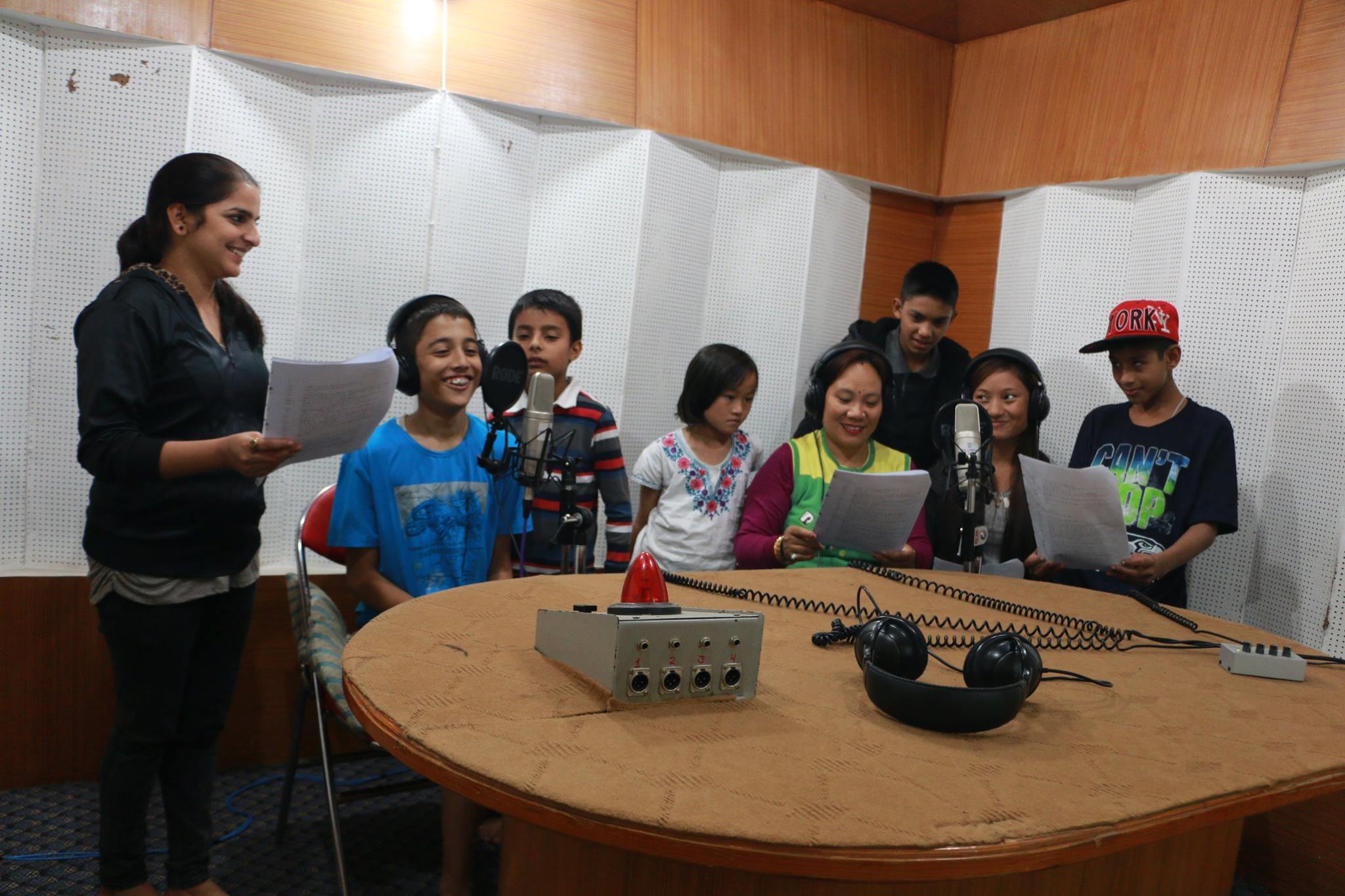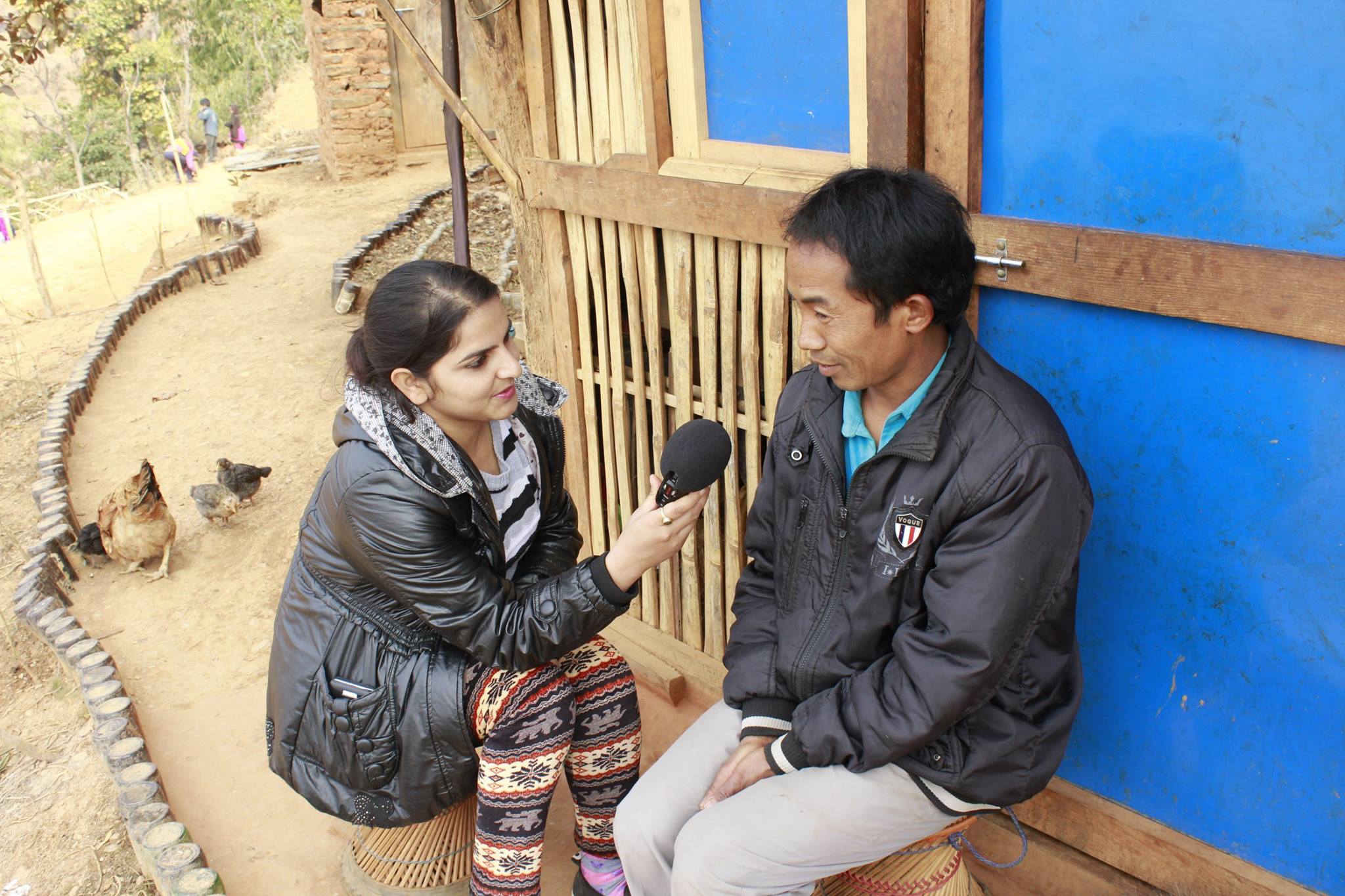SOCIAL CHANGEMAKERS BLOG ISSUE NO.6: Sabita Acharya, Program Producer, Saathi Sanga Manka Kura: Giving Voice to Nepal's Youth
Young people tend to be closer to their friends because with their peer group they can share anything and everything without the fear of being scolded or judged. And if there is any radio program which is a peer group, it travels a long journey. Thus, is why Sathi Sanga Manka Kura (SSMK) has captured the heart of so many Nepali youths. Since last 18 years, SSMK is listening to youth voices and helping young people to solve their problems. It is the longest-running youth radio program. This week we spoke with one of the ‘Sathis’ (friends) of SSMK- Sabita Acharya, who is also the program producer (writer, editor, presenter) of the program.
What was the motive behind starting this program?
This program started in 2001. Back then, young people could not openly talk about issues related to HIV/AIDS, sex, relationships etc. because of the existing social barriers. A survey was conducted by UNICEF, which concluded that awareness programs were really important. Subjects such as sex, HIV/AIDS are still considered as taboo and as this was a decade ago, it was extremely challenging. Hence, to get people to talk about HIV/AIDS and sex education and I it was decided to create an awareness using radio as a medium and this is how the program was started.
How did you get associated with Saathi Sanga Manka Kura?
Numraj Khanal, a brother from my village told me about a vacancy opening and asked me to apply. He was also my teacher. He told me it was a youth-related organization. I had just completed my +2 examinations then and I was in Pyuthan, when I got a call for the interview. I was really confused. To be honest, I was scared because I had sent my CV to the same friend who then sent it to the office. I didn’t know what I was being interviewed for. However, when I found out it was for Sathi Sanga Manka Kura, I was really relieved because I knew about the program, I really liked it and often used to listen to it. So that’s how I’m with Sathi Sanga Manka Kura, since September 12, 2011.What do you like the most about this program? How do you prepare it?
I love everything about this program, especially the issues we focus on. We work on various issues related to youth and adolescence, their problems, experiences etc. The topics we choose and the entire package, which we present is decided three months earlier. We look at the Interactive Voice Response (IVR) that we receive from our listeners. We have a toll-free number where listeners record their message. We also have Voices of Youth (VOY)- SMS number where listeners can send their message. We collect all the responses sent by mail and SMS and then the whole team sits for a discussion and decides, which issue needs to be highlighted most. For example, if we get a lot of responses regarding child marriage, we prepare for it. It’s similar to voting- a listener will vote for the issues to be addressed. Because these are the issues our listeners are interested in.
How do you create the outline for the program? What are the particular skills you bring to the program? Before creating the outline, we first need to understand the issue. For example Harassment. It has different dimensions like harassment in public transport, in the workplace, in the schools/colleges and harassment within the family.
So, we must decide which particular area are we going to work in. Then some of us prepare dramas, that we telecast at the later part of a program that subjectively presents the issues we present. Some prepare chats highlighting the issue. We call the narration part of the program as chat. We go through the letters, stories sent by our listeners. If their story match with the issues we have taken, we play their stories. “A friend from Rasuwa has sent us a story, which we are going to narrate/play in the drama…” We never reveal the person’s name, we keep it anonymous which is also one of the reasons why we are trusted by our audience. We decide beforehand what to keep in the chat, it could be someone’s interview or a success story or a letter. We always decide what to keep, what needs to be added and everything else before we finalize the script.
Our program and the content focus in imparting life skills among young people. Self-awareness, creative thinking, effective communication, critical thinking, decision making, coping with emotions, these are some of the life skills that will help young people to tackle problems and find solutions. We basically revolve our program around these aspects.
How hard is it in Nepal to create awareness about problems through the radio in a time when social media is so dominant?
We chose the medium of radio because back in 2001, radio was the most accessible and thus effective. We can tune into radio even while we work, or while studying, or even chatting with friends. Even more, it was easy and cost-effective. I want to share my own story- When I was in class nine, we used to have coaching classes on Saturday. We were returning home and Saraswoti, one of my friends exclaimed: “Eh it’s 3 o’clock, time for the program (Sathi Sanga Manka Kura)”. I didn't know about the program. It was during rainy season, she held my hand and forced me to cross the river. There was a house nearby of Badi community. She asked for their radio and tuned in the show. That was the first time I listened to the program. It was about girls trafficking. Now, had it been a television show, there would be uncomfortable to go into somebody else’s house, but because it was a radio program we were able to bring it outside and listen. So, I think radio as a medium is effective to deliver messages. However, as days are getting advanced; our programs are also using various social media. We have Facebook, Twitter, YouTube channel where we upload programs and interviews, but we are most active on Facebook. The power of social media is that if I see anything important, I can easily share it with my friend circle. This is also why SSMK has been using social media.
As we have advanced, has there been a shift in youth problems and the causes of their problems? What are some of the more recent problems that youth in Nepal are facing?
Before we used to get letters from our audience regarding their problems, today they sent messages via Facebook, VOY, IVR. There is no big difference in the problems, but because of awareness today people have started to speak up about the problems. The recent problem that most of the youth and adolescents are facing is harassment/ abuse. These days, most families are busy. Working parents cannot give much time to their children, so children spend more time with friends/ peer group. We get a lot of responses regarding youth falling into bad company and getting into a bad habit because of peer pressure. The problems are the same, but the factors which cause the problem have increased. And with the access to internet facilities, the rate of cyber-crime has also increased. Particularly, young people who are in a relationship, they tend to share their Facebook password. And later when they break up, they misuse their account. Both young girls and boys have been through the problem but it’s particularly high among girls. We got a letter regarding the same problem. She was blackmailed when the relationship ended. They had been in a physical relation and the guy had her pictures. We played her story and also dealt with the problem. We took the help of police because remaining silent is never going to solve the problem but only make the perpetrator stronger. We must fight back. The girl reported to the police and the boy got arrested. The video, the photo was deleted and he was sent to jail. The girl was thankful and said she could have committed suicide had there been no help.
Can you share some of the most exciting incidents you encountered while working with youth?
I’d like to share one incident. We had gone to Panchthar district (aftermath of the earthquake) to understand the situation of students in the affected schools. At the school we saw Amliso (broom grass plant). We wanted to buy some. There was an old man nearby who said he would give us Amliso if we agree to go to his house for tea. We went to his house. He told us that he liked our program very much. He even shared that he and his son, both, used to listen to the show but separately and one day they came across each other. He further told us that before he used to think why would his son want to understand about issues like sex, menstruation, reproduction but these subjects are a concern for everyone and not just one person. Both felt the importance of the program and it was then that they decided not to hide and sit separately but sit together and listen to the program. We also went on air to play his story.
This is what I enjoy the most- Sathi Sanga Manka Kura has worked as a bridge to reduce the generational gap while addressing youth issues.
What has been the impact of the program in terms of changing young people’s lives? What are some of the achievements that you are particularly proud of?
I want to share two incidents, which I love to share with everyone. This incident occurred 2-3 years ago. It was during the winter season and I was waiting for a micro-bus. I got into one and luckily, I got a front seat. The driver was playing our show. I had my face covered with scarf, mask, I was unable to be recognized. When the conductor asked me for a fare I told him “Ï have a card”. To this, the driver looked at me. The radio show was going on, I had hosted that show so, he looked at me again and asked me if I was Sabita didi. I removed my mask and smiled to him. We had a small chat. He was from Dhading, he had dropped out after class eight because of financial problems. He was confused and during this time he had listened to the program. He told me that the topic the show had addressed then was doing something in our own country rather than foreign employment. He shared that after listening to that episode he was really motivated to do something rather than nothing so, he came to Kathmandu and worked as a conductor. Later he learned driving and got a license and is now working. He further said, had he not listened to the show that day, he would have got married, have kids, work abroad and his life would be different than what it is today. He had refused to take my fare but I insisted. To this he replied, “You might find a lot of people like me, you might not remember me but If I ever happen to call you please do speak to me”. I was extremely happy and shared this to the office the next day. It felt so good, I even wrote about it.
Another incident is, one of our listeners sent us a Facebook message asking if we could provide older episodes because on our website only the series from the 400th episode are available. We really wanted to talk to the person, we did his audio recording too which we played in our show. He had once faced family pressure to go abroad. In the meantime, he had listened to a story in the show i.e. a letter discussion about doing something in the country itself. After hearing that he convinced his family and instead filled the form for further studies. He said he sold vegetables and saved money for further studies, now he has opened a shop. These incidents really make me happy.
Many people are often pessimistic about the future of young people in Nepal as so many are leaving the country. How do you see the future of young people in Nepal?
I see a very bright future of Nepali youth. We must have a positive perspective. Working abroad is not easy. I’ve seen a lot of people going to Japan, America, Australia being very excited. However, how long does it take for them to earn the money like 8-10 lakhs? They are not treated in the same manner in another country, a small mistake might cost them very much. Instead, if we could invest the same amount in Nepal, we can do anything. Yes, at some point, we might face difficulties, there might be no profit, but one must not panic because of the loss. There is no gain without pain. Again, people might have their own interest but the future of youth is more than just settling or working abroad. We are also Nepali youth, we are happy working in Nepal. For me, I am working in Sathi Sanga Manka Kura, I’m working to address and solve the issues/problems faced by Nepali youth. We can do a lot in our own country.
What message would you like to give to young people in Nepal?
Today’s youth are very much capable, but they have not been able to exercise their skills and potential. So, you should examine yourself, understand your skills, abilities and identify who can support you to move forward. To the youth who are facing problems, you must understand that everyone faces problem during their lifetime. Do not fear your problem. There will be many ways to solve that problem. Always speak up about your problem, keeping silent will never find a solution to your problem. But when you speak, you must speak to the right person, at the right place and at the right time.
To know more about Saathi Sanga Manka Kura:
http://equalaccess.org.np/archives/series/sathi-sanga-manka-kura


